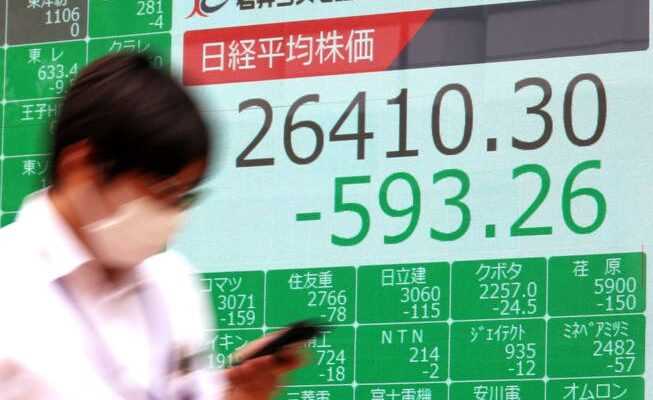The downward slide continues on the stock exchanges. Rising interest rates, concerns about growth and the political crises are driving investors away.
Prices continue to fall on the Japanese stock exchange as well.
The stock market continues as it stopped before the weekend: with lower prices. In Europe, prices at the opening of trading briefly withstood the pressure. But after a few minutes the air was out. The leading German index DAX lost around 0.3 percent by 9:30 a.m.
Until then, the Swiss heavyweight index SMI was around 0.6 percent in the red. The financial stocks UBS (+0.8%) and Swiss Re (+0.6%) did relatively well. “Rising yields promise better returns for financial houses,” said one trader. The market was weighed down by the heavyweight Nestlé shares (-0.3%), which fell after initial gains, as well as the two pharmaceutical giants Novartis (-0.8%) and Roche (-0.6%). The technology stocks Logitech (-3.3%), AMS Osram (-2.0%) and VAT (-1.4%) were under pressure, which can be explained by the negative guidance from the American stock exchange Nasdaq.
The American Dow Jones index was down 0.3 percent at the close of trading on Friday, and the technology index lost 1.2 percent.
The Asian markets got off to a weak start on Monday morning. Japan’s Nikkei Index fell 2.5 percent and the Shanghai Stock Exchange fell 0.4 percent. The CSI 300 index, which lists China’s top 300 companies, fell almost 1 percent. Australia’s S&P/ASX 200 fell 1.18 percent.
“Don’t grab a falling knife”
The situation is unlikely to ease for the time being. Investors are currently acting according to the motto “never catch a falling knife”. So they didn’t want to grab a falling knife, said one trader. Bargain hunters are also likely to make themselves scarce in view of the downward trend. “We are in a bear market and it should take some time,” says another broker. There are many reasons for this: The difficult environment with the Ukraine war, high commodity prices, supply bottlenecks, ever-increasing inflation, fears of interest rates, the risk of recession and the consequences of the extremely restrictive Covid measures in China.
Nervousness remains high
This does not mean that too much good can be expected for the coming weeks and months. The mood among investors is correspondingly bad and nervousness is high. In addition, many market participants were worried about rising bond yields. This means that financing for companies will become more expensive and there is an increasing threat of stalling the economy. But given the high inflation, the Fed will have to give preference to the fight against rising prices over rising prices on Wall Street, it is feared.
With material from AWP.
